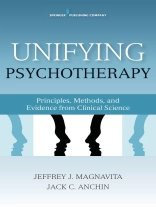With over 1, 000 approaches to psychotherapy, many of which have few substantive differences, how can a therapist know which one will provide the most effective treatment? Unifiedpsychotherapy, a significant new paradigm in the evolution of psychotherapy, is a multicomponent, biopsychosocial systems model that draws from all of the major psychotherapeutic models andis grounded in the belief that a combination of theory and practice, supported by evidence-basedresearch, is the key to effective psychotherapy. This book provides a practice-friendly presentation ofthe theoretical and evidence-based foundations, principles, and methods of unified therapy.
The book offers clinicians and students a framework they can use to select from a variety of technicalinterventions based on an understanding of relational principles. It includes specific intervention strategiesthat can be used with the full spectrum of individuals suffering from psychological disorders andrelational disturbances. Unifying Psychotherapy describes a paradigm that is anchored in a holistic biopsychosocialsystems model of personality and psychopathology and encompasses four domain levelsranging from microscopic to macroscopic. Detailed assessment and treatment principles consider theinterplay between the components of all four levels of the biopsychosocial systems model. Evidence-based interventions that are clearly described along with case illustrations underscore theimportance of flexibility as an essential component in using unified psychotherapy. The book alsodiscusses current developments in psychotherapy, clinical science, and the discipline of psychologyitself as they pertain to the use of unified therapy.
Key Features:- Presents a state-of-the art examination, analysis, and appraisal of unified psychotherapyas the next wave in the evolution of the field
- Details the theoretical and evidence-based foundations, principles, and methods of aspecific unified approach to psychotherapy
- Provides an organizing metatheoretical model that drawson all domains to form a unifying framework to guidetherapeutic processes and practices
- Describes evidence-based interventions with case examples
สารบัญ
‘
Foreword
Preface
Section I: Theory and Evidence for Unifying Psychotherapy
Chapter 1: The Emergence of a Unifying Paradigm for Psychotherapy
Chapter 2: The Personality System
Chapter 3: The Relational MatrixóFundamental Principles and Processes
Section II: Unified Psychotherapeutics
Chapter 4: The Mind/Brain
Chapter 5: Self and Other Dyads
Chapter 6: Triads and Family Systems
Chapter 7: Larger Systems
Section III: Clinical Strategies of Unified Psychotherapy
Chapter 8: Unifying PsychotherapeuticsóIntrapsychic & Dyadic Levels
Chapter 9: Unifying PsychotherapeuticsóTriadic, Family, & Sociocutural Levels
Chapter 10:Formulation of Unified Treatment Packagesó
Clinical Decision-Making in Unified Therapeutics’เกี่ยวกับผู้แต่ง
Jack C. Anchin, Ph D, FAPA, , is adjunct professor of psychology at SUNY at Buffalo and a
clinical psychologist engaged in full-time private practice for over 25 years.












